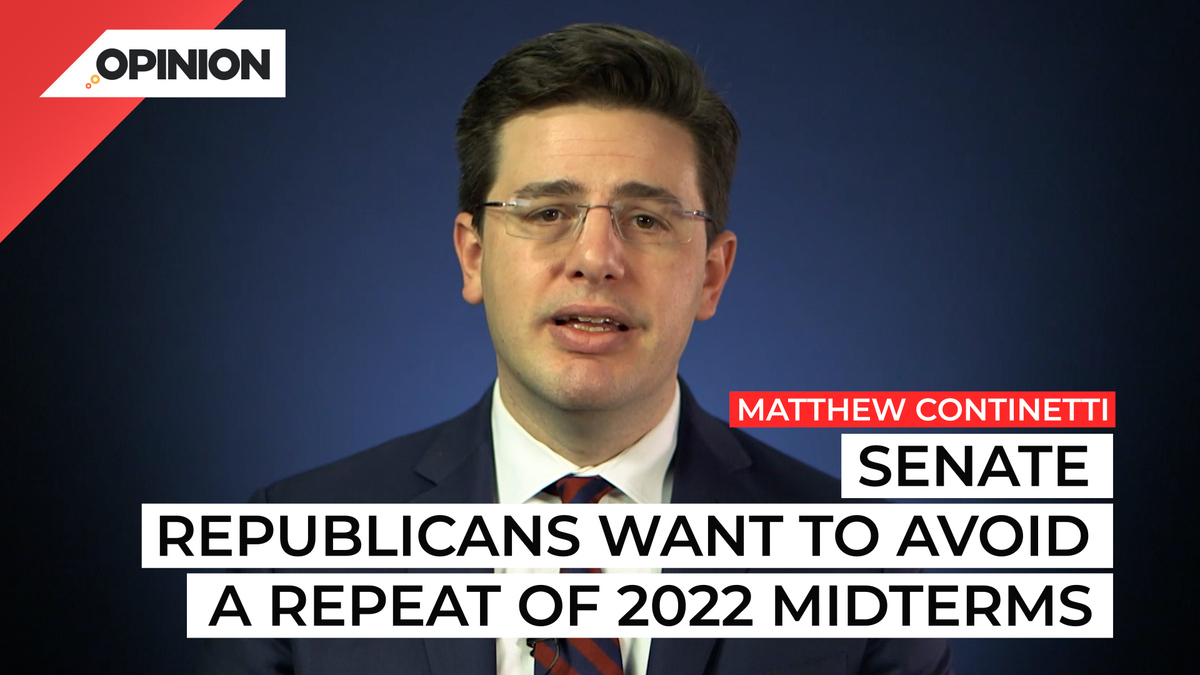
Commentary
-
Our commentary partners will help you reach your own conclusions on complex topics.
At first glance, Republicans are on their way to capturing the Senate. They need a net gain of two seats, or one if the GOP wins the presidency, to take control of the chamber. And they have plenty of targets. Of the 34 seats up for grabs, two-thirds are held by Democrats or by independents who caucus with Democrats. Moreover, Democrats must defend three seats in states that backed Donald Trump by considerable margins in both 2016 and 2020.
The Democrats also must defend five additional seats in states that President Biden won by less than five percent. In contrast, there are no Republican incumbents from Biden states, and just two whose previous election margins were below five percent. Ted Cruz of Texas and Rick Scott of Florida come from states that Trump twice won handily, and that are more than likely to be red next year as well. But looks can be deceiving.
The last election cycle also seemed promising for Senate Republicans. They held 50 seats, enjoyed a favorable political environment, and eyed potential pickups in three states that Trump lost narrowly in 2020. They ended up losing one seat, and they’ve been squabbling with each other ever since. Senate Republicans want to avoid a repeat. As always, candidate quality will be essential. A good candidate is likable, telegenic, fluent in the issues, quick on his feet, and appropriate to the culture of his state. To avoid a replay of 2010, 2012, and 2022, Senate Republicans not only will have to put up a presidential nominee who can win the battlegrounds of Georgia, Arizona and Wisconsin, they also will have to choose Senate candidates whose personal traits and policy preferences don’t send independents and suburbanites running for the hills.
Consider the four races that the University of Virginia Center for Politics classifies as either “lean Republican”, or as toss-ups. The most vulnerable incumbent is Senator Joe Manchin of West Virginia, whose seat is rated “lean Republican.” The GOP hopes that the 75 year-old Manchin will announce his retirement, guaranteeing a pickup and freeing money for other contests. If Manchin does run, he faces an uphill battle, but the degree of difficulty depends on his opponent. West Virginia is no slam dunk.
The new head of the National Republican Senatorial Committee, Steve Daines of Montana, has a keen interest in defeating his fellow Montanan Jon Tester. Don’t underestimate Tester, though. Behind his good ol’ boy persona is a shrewd politician who has impressed me since I first met him in 2006. Sherrod Brown of Ohio, like Manchin and Tester, is a Democrat who has thrived in a red state thanks to talent and luck. Brown’s talents include a knack for retail politics and economic nationalism that appeals to populace of all stripes and a constituent service program that is well regarded on Capitol Hill and much appreciated at home.
Brown’s luck is his timing. All three of his senate campaigns took place in Democratic years. He draws opponents who lack personality and who carry baggage. The final toss-up, Arizona, will feature several familiar faces. The GOP doesn’t have a frontrunner. Tech executive Blake Masters, who lost to Senator Mark Kelly last year by four points, is contemplating another bid. Former news anchor Kari Lake, who lost the governor’s race to Katie Hobbs last year by less than one point, met with NRSC officials in Washington in early February. If the Arizona GOP nominates Lake or Masters or another ultra-MAGA social media personality, a chunk of the party is likely to back incumbent Kyrsten Sinema, and the Democrats would be one step closer to keeping their Senate majority.
If Republicans are serious about winning the Senate and potentially gaining unified control of the federal government, they need to select candidates for office who appeal not only to the grassroots, but also to independent voters, and who understand that Americans want common sense answers for pressing economic and social problems, not conspiracy theories, harsh rhetoric and spite. If Republicans are serious about winning the Senate, they need to get serious about who represents their party. They’ve blown it once. They can’t afford to blow it again.
-
What kind of leader America needs
The American public remains divided and unhappy about the state of the country leading up to the next presidential election, and former President Donald Trump now holds a narrow lead in the matchup against President Biden. While Biden portrays Trump as a threat to American democracy, voters in key states ironically trust the former president…
-
NATO is stronger now than ever before
The North Atlantic Treaty Organization (NATO) has been called the most powerful military alliance in world history, and serves as the bedrock of military security for Europeans, Americans and allied populations around the globe. The importance of the alliance has been reiterated by recent events, namely Russia’s invasion of Ukraine and increasing threats from China.…
-
Who will Trump pick for vice presidential running mate?
Donald Trump is now clearly on track to run as the GOP candidate for president in the 2024 elections, regardless of how his various criminal trials proceed. What’s less clear is who else might run as his running mate for the position of vice president. Straight Arrow News contributor Matthew Continetti reviews a list of…
-
Education, income becoming key variables in elections
Education, income level, geography, race and ethnicity are all key variables in estimating who voters might support. But the importance of these variables has changed in recent elections, as America’s demography, culture and political movements continue to evolve. Straight Arrow News contributor Matthew Continetti argues that education and income level have become more important than…
-
If we’re lucky, AOC and the Squad are on their way out
The Squad, comprised of eight left-wing House Democrats, has been openly critical of Israel both before and during Israel’s war with Hamas. As primaries approach, some of these House members are facing challenging political races. Straight Arrow News contributor Matthew Continetti delves into the backlash against the Squad and hopes its members will face a…
Latest Opinions
-
 U.S. Department of Defense
U.S. Department of Defense
Congress still trying to figure out how to reduce wasteful military spending
-
 DVIDS
DVIDS
US Navy, Air Force making waves with new weapons at RIMPAC
-
 Getty Images
Getty Images
Israeli PM Netanyahu meets with Trump at Mar-a-Lago
-
 Getty Images
Getty Images
Growing US nuclear power resurgence reaches the nation’s heartland
-
 Getty Images
Getty Images
Beer from the sun, other solar thermal projects get government funding
Popular Opinions
-
In addition to the facts, we believe it’s vital to hear perspectives from all sides of the political spectrum.


